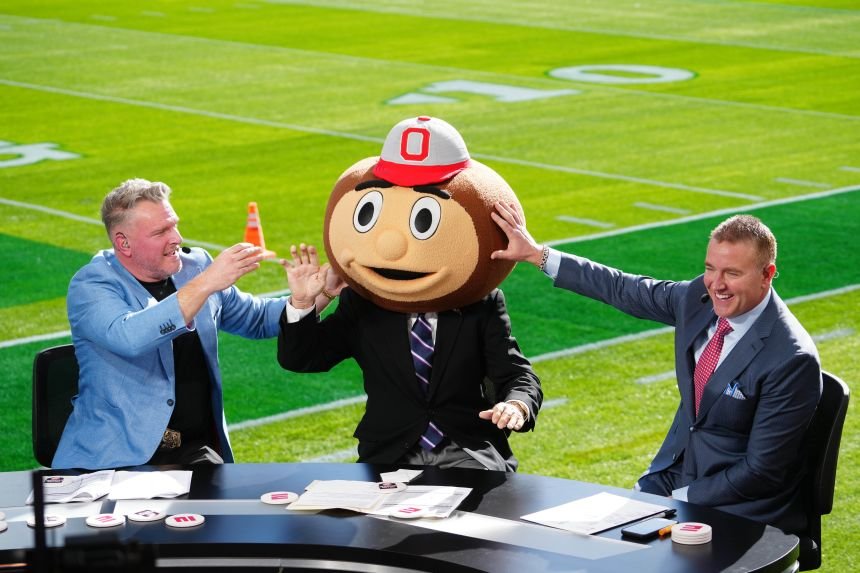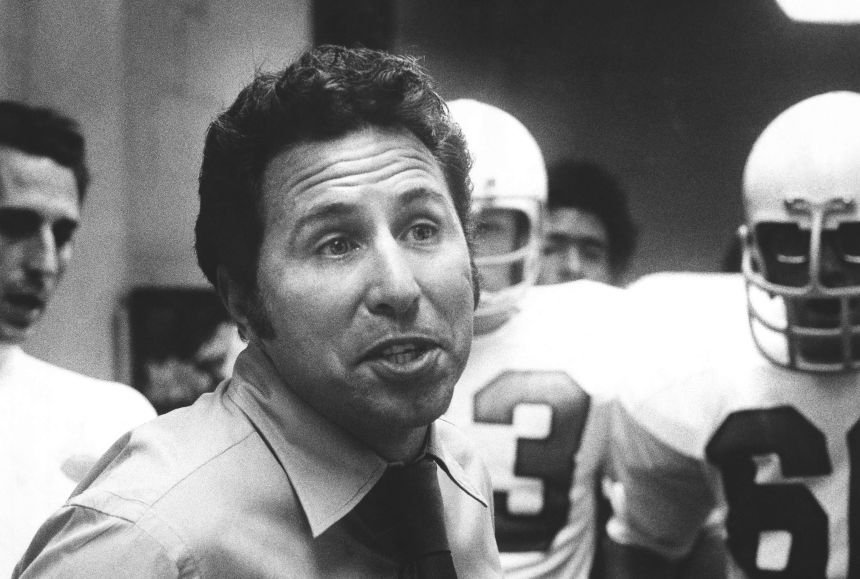For one final time, Lee Corso will don the head of a college football mascot and utter his famous catchphrase: “Not so fast, my friend.”
Saturday’s ESPN broadcast of defending national champion Ohio State hosting Texas will signal the end of the era as Corso steps away after a legendary stint in college football.
First as a player, then a coach and finally a broadcaster, the now-90-year-old has been a mainstay in the collegiate ranks for more than 75 years and has had an immeasurable impact.
Known for his larger-than-life personality – and the even bigger mascot heads he’s worn – Corso retires as one of the pioneers of football television.
“My goal on TV was to bring a smile to everybody’s face. I hope I have done that,” Corso said on stage at the Dolby Theatre in Los Angeles when he was honored at the ESPYs in July.
Corso’s football career began in the 1950s when he took the field for the Florida State Seminoles, where he played as both a quarterback and cornerback. As a CB, he held the school record for interceptions for two decades.
After graduating, he turned his attention to coaching. Over a 28-year career, he coached at Louisville, Indiana, Navy and Northern Illinois, as well as a brief stint as the head coach of the Orlando Renegades in the United States Football League (USFL).
His achievements across multiple programs have led to his induction into multiple athletic Halls of Fame, including at Florida State, Louisville and Indiana, in addition to the state of Florida Sports Hall of Fame and the Kentucky Athletic Hall of Fame.
But it was only when the USFL fell apart in the mid-1980s that Corso turned his attention to television.
He was hired to be part of ESPN’s “College GameDay” program as an analyst in 1987 and, for 38 seasons, has remained an anchor of the team.
In 1996, Corso started something that had a lasting impact not only on the show but on college football as a whole: wearing oversized mascot headgear during live broadcasts.
Ahead of that season’s Ohio State-Penn State game, Corso put on Buckeyes mascot Brutus’ headgear and the rest was history.

Since then, Corso has dressed up as Notre Dame’s Fighting Irish Leprechaun, the Stanford Tree, and even rode a motorcycle with the Oregon Duck, among many others that brought smiles to not only the faces of fans but also his colleagues.
Corso would don the comically large headpieces while making game predictions, holding a Ticonderoga No. 2 pencil in hand and uttering his famous catchphrase. This famed tradition has been a staple on ESPN’s college football coverage for almost four decades.
Corso has made 430 mascot headgear selections all-time, compiling a 286-144 record. He has thrown on Brutus’ head the most at 45 times with Alabama mascot Big Al’s head coming in second with 38 picks.
He has worn the headgear of 69 different teams and, as a former assistant coach at Navy, has never picked against the Midshipmen. He went on a magical streak of predictions in 1999, going 11-0 with his headgear picks, the most wins without a loss in a single season since he began the tradition.
“My family and I will be forever indebted for the opportunity to be part of ESPN and College Gameday for nearly 40 years,” Corso said when his retirement was announced in April. “I have a treasure of many friends, fond memories and some unusual experiences to take with me into retirement.”

In 2009, Corso suffered a stroke which left him unable to speak for a while but he eventually made a return to ESPN’s coverage.
A year later, he was honored by the National College Football Awards Association with the Contributions to College Football Award in recognition of his lifetime of achievement and integrity in the sport.
Ahead of his final game, Corso was honored by Southwest Airlines as he waited to board his flight to Columbus, with the staff and waiting customers all giving him a standing ovation.
“With the popularity and cultural phenomenon that ‘GameDay’ became, there’s no one more responsible for that than Lee Corso. He changed the way the game was covered with the irreverence, the humor, the lack of a filter, all of those things that sort of set the tone and the standard,” “GameDay” host Rece Davis said of Corso’s impact on ESPN’s coverage.
Corso steps away as a seemingly ever-present figure on college football coverage and one whose impact will be felt for the next generation of broadcasters and fans.
Will someone else put on the mascot headgear to continue and honor Corso’s tradition? Or will the segment also be retired alongside Corso? One thing is for sure though: The future of college football broadcasting will most certainly look very different without him on the panel.























